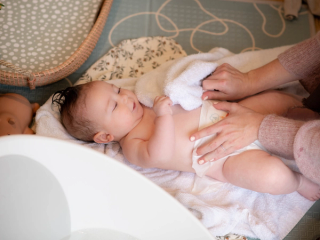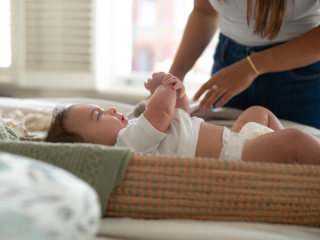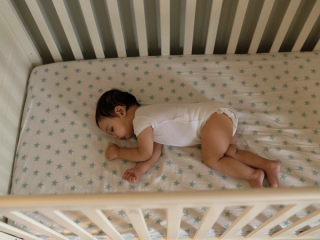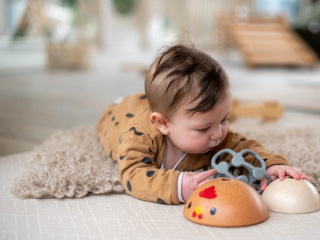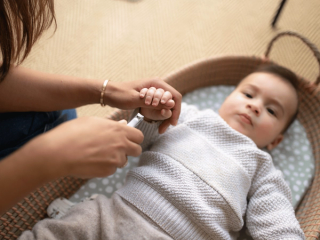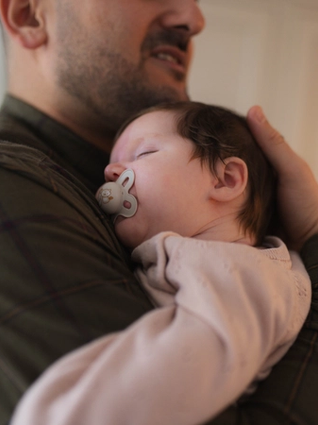
- Home
- Advice And Support
- Newborn
- Essential Newborn Care
- Understanding Newborn Sleep Patterns
Newborn sleep
Adjusting to life with a new baby is a huge transition. Throw into that lack of sleep and it can feel really tough. So, let’s talk all things newborn sleep.
Congratulations on your new tiny bundle of joy! You may have been told by well-meaning friends and family to ‘enjoy this time’ because this is the ‘easy part’, but it doesn’t feel all that easy right now. Adjusting to life with a new baby is a huge transition. Throw into that lack of sleep and it can feel really tough. So, let’s talk all things newborn sleep.
What to expect?
Your newborn baby will probably sleep a lot! In fact they will need anything from 14 – 17 hours of sleep in a 24-hour period, but there is no real routine or pattern to their sleep habits just yet. All this sleeping doesn’t leave much time to be awake. From 0 – 3 months old your baby will only be able to manage around 30 – 90 minutes of awake time. Just enough time to feed, burp and change their nappy before it’s time to put your baby down again.
I highly recommend keeping one eye on the clock when it comes to knowing when it is sleep time for your baby. Sleep signals are a really good indicator, but more alert babies often won’t display these signs or they show them much later on. An awareness of wake windows alongside sleepy cues is therefore really helpful.
When it comes to signs of tiredness, we can categorise these in three stages:
Stage one: ‘I’m going to need to sleep soon’
- Staring or glazed expression
- Red eyebrows or under eyes
- Loses interest in toys, people and surroundings
- Moves head from side to side
Stage two: ‘I need to go to sleep now’
- Yawning
- Becoming irritable or grizzly
- Rubbing eyes or ears
- Frowning
Stage three: ‘I need to be asleep already and now I’m over tired’
- Crying inconsolably
- Tight fists
- Arching back
- Wriggling and pulling up knees
If your baby reaches stage three this can feel very overwhelming and stressful for parents. It’s OK. This will happen sometimes and you will be able to help your baby calm down and sleep. Do your very best to stay calm through this, as your baby needs your help to calm down too. Moving yourself to a darker, quieter space can be helpful. Try swaddling your baby (do not swaddle once your baby is able to roll), hold them close to you and try gentle rocking or bouncing. Feeding your baby or offering a dummy can also be helpful ways to help soothe your baby if they have become very distressed.
Witching hour
Speaking of unhappy newborns, let’s talk about the ‘Witching Hour’. You may have heard this term before becoming a parent and wondered what on earth people were talking about – but now it has all become clear!
There seems to be a time of day your baby always becomes increasingly fussy. `this tends to happen in the evenings sometime between 5 – 11pm. Although it’s called the witching ‘hour’, the length of time this period of fussiness lasts can vary from just a few minutes up to 2 hours. Generally, this starts to happen around the 2 – 3 week mark and can peak at 6 weeks. The good news is that by around 3 – 4 months old babies have generally outgrown this phase.
The witching hour will usually happen because babies become overtired and overstimulated. Although they have been sleeping for what seems like all day long, they may not have been able to reach the deeper more replenishing stages of sleep and so by late afternoon things can feel really challenging. By keeping an eye on their wake windows and tired signs you will be able to help minimise the extent to which witching hour affects your baby.
If you still find that late afternoon and evenings are difficult try some of these things to get through it!
- Calm things down – start to put the house into ‘night time’ mode by dimming lights, reducing noise and keeping play more low key. Not only will this start to help your baby differentiate between day and night it will also help avoid over stimulation.
- The great outdoors – Taking your baby for a short walk, wander round the garden, or even simply looking out of an open door or window can really help relax them. Exposure to natural day light in the evenings will also help babies sleep more soundly during the night.
- Water for calm – Water is a wonderful way to relax a fussy baby. A warm bath or wash with flannel can be very soothing. The sound of running water also sounds similar to those sounds heard in the womb!
- Hand off – After a full day caring for your newborn it is understandable you may be feeling more agitated and stressed (not to mention you are exhausted, hormonal and still adjusting to parenthood!) If you have someone who can support and help you during this time, take the help. Your baby is very intuitive and will pick up on your anxiety, so take some time to reset whilst someone else looks after the baby.
Bedtime
Once you have made it through witching hour, it’s time for bedtime – but when should you start a bedtime routine and what will that look like for your newborn?
I always say you can start a bedtime routine from day one, or simply whenever you are ready and want to! From around 6 – 8 weeks your baby has more of a sense of day and night and so if you haven’t already here is a great place to start.
Having a routine that you repeat every night before putting your baby to sleep for the evening will really help you when they become older and ready to sleep longer stretches and ultimately sleep through the night. This routine will become a strong sleep association for your little one and as they grow reinforces their natural circadian rhythms.
Your routine need not be complicated, just a few simple steps that allow you all to relax and wind down for the evening. This may include a warm bath or wash down, baby massage, PJs, lullabies or special songs just for sleep, a feed, white noise and your special goodnight phrase.
Safe sleep guidelines recommend room sharing until at least 6 months old so your baby may sleep downstairs in a crib or Moses basket until you yourself go upstairs to bed. You can keep downstairs in ‘night mode’ with low lighting and a calmer, slower pace.
Advice & tips

Want to read more? Join the HiPP BabyClub for full access to this article.
As a BabyClub member, you'll get access to a range of exclusive benefits, including:
Monthly competitions
Discounts from our Partners
Expert advice tailored to your little one's age
Weaning recipes
HiPP shop discounts*
*10% off HiPP's online shop does not apply to our First Infant, Anti-Reflux or Comfort Formula Milk.
Important notice: Breastfeeding is best. Follow on milk should only be used as part of a mixed diet from 6 months. Talk to a healthcare professional.





